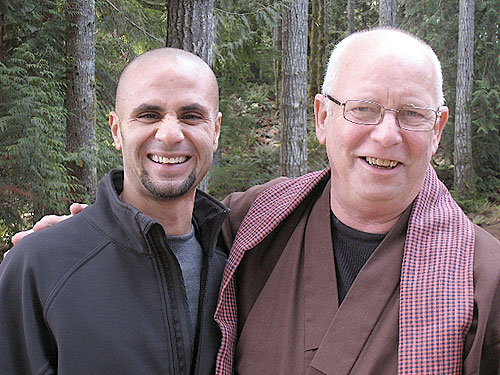
Kobai Scott Whitney (right) leads a Buddhist 12-Step recovery group and is active in Buddhist prison work with inmates, returnees, and prison volunteers. At left is Oregon prison chaplain Richard Torres.

Recovering Buddhists, Out of the Closet
Plum Mountain Buddhist Community has joined several other Dharma groups in the Northwest in sponsoring a Buddhist 12-Step Study Group. The group meets in Olympia, WA.
“The roots of the 12-Step movement are found primarily in a theistic Christian tradition,“ says Kobai Scott Whitney, facilitator for the new group. He believes there needs to be a comfortable space for non-Christians to pursue the spiritual elements of their recovery from addiction.
There has also been an issue within Buddhist sanghas where members feeling they have to keep their history of addiction or their current participation in 12-Step groups a secret from their teachers or fellow sangha members. “Even though there is a long history of Buddhist leaders going into treatment or seeking out self-help fellowships for their addictions,” says Whitney, “it’s a topic that’s still not quite out of the closet.”
There is increasing attention being paid to this issue and new Buddhist addiction recovery titles are sprouting like dandelions on a spring lawn. Possibly the most popular is Kevin Griffin’s One Breath at a Time, in which this Bay Area musician and Vipassana teacher recounts his struggles with addiction, as well as his grappling with the Higher Power (always referred to as He) that the 12–Step programs insist that their members must find and surrender to.
Writing of the changeable nature of the Higher Power concept, Griffin says, “As you work with the Steps, your understanding of a Higher Power may change many times. It can be helpful to know that you don’t have to commit yourself to one concept for life. In fact, oftentimes the change in understanding is a developmental process that moves from a more external Higher Power to an inner one.”
Other recent publications include: 12 Steps on the Buddha’s Path, by Laura S., The 12–Step Buddhist by Portland author Darren Littlejohn and Cool Water: Alcoholism, Mindfulness, and Ordinary Recovery by William Alexander. Noah Levine, of Dharma Punx fame, has also inspired many younger Buddhists to combine their search for recovery with their Buddhist path.
In addition to hard-cover books, there are other resources on the Web. Santikaro, a teacher who frequently visits the Northwest, has a series of audio files on the 12 Steps and the 12 Traditions. These can be found at the site of his Liberation Park website: www.liberationpark.org. There is also a site for the Buddhist Recovery Network at www.buddhistrecovery.com. This organization has a listing of 12-Step Buddhist Study Groups around the world, including three in Portland, one in British Columbia and another four in Washington. Kevin Griffin’s website is also very helpful: www.kevingriffin.net.
Kevin Griffin will be in Portland in the spring as one of the main presenters at the Prison Dharma Conference co-sponsored by Northwest Dharma Association and Plum Mountain Buddhist Community. (Look for future announcements on the NWDA website.)
For current details about the Olympia Buddhist 12-Step Study meeting please contact Plum Mountain Refuge. [www.plummountain.org]
Kobai Scott Whitney will lead a one-day 12-Step Buddhist retreat in Seattle on December 5th. See “Calendar” at www.northwestdharma.org or www.plummountain.org for details.
Contributor: Kobai Scott Whitney.
Photo: Caterina De Re.